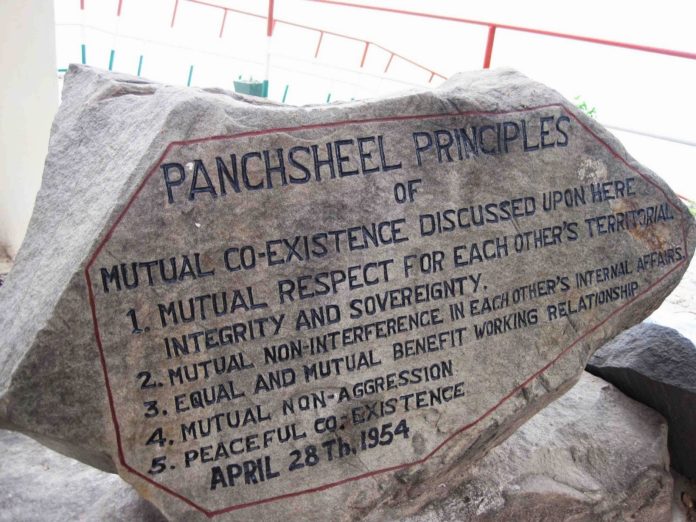Seventy years ago, China introduced the Five Principles of Peaceful Coexistence amid a turbulent geopolitical landscape. They were initiated post-WWII, against the backdrop of national independence movements and the Cold War. Articulated by Zhou Enlai on December 31, 1953, during a meeting with an Indian delegation, these principles were later formalized in joint statements between China and India, and China and Burma (now Myanmar) in June 1954. The 1955 Asian-African Conference in Bandung, Indonesia, further endorsed these principles, incorporating them into the broader framework of international relations.
Initially aimed at maintaining peaceful ties between China and India, these principles have since become a cornerstone of China’s foreign policy and have gained widespread acceptance globally.
The Five Principles of Peaceful Coexistence are:
1. Mutual respect for sovereignty and territorial integrity.
2. Mutual non-aggression.
3. Non-interference in each other’s internal affairs.
4. Equality and mutual benefit.
5. Peaceful coexistence.
Global Acceptance and Impact
The Five Principles have significantly influenced international relations, particularly among developing nations seeking a fairer global political and economic order. In 1970, the United Nations General Assembly adopted the “Declaration on Principles of International Law concerning Friendly Relations and Co-operation among States,” which included these principles, marking their global acceptance.
Relevance in the Contemporary World
Over the past half-century, the Five Principles have demonstrated their resilience and adaptability. Despite dramatic changes in the international landscape, these principles continue to guide China’s diplomatic efforts, transcending social systems and ideologies, and promoting global peace and cooperation.
China’s Commitment to the Five Principles
China has consistently adhered to these principles, striving to develop friendly and cooperative relations with all countries. This commitment is reflected in China’s participation in various international initiatives and organizations, such as BRICS, FOCAC, and the Belt and Road Initiative. These efforts demonstrate China’s dedication to non-interference, mutual benefit, and peaceful resolutions to conflicts.
Furthermore, at the conference marking the 70th Anniversary of the Five Principles of Peaceful Coexistence, China’s President Xi Jinping in his speech highlighted the purpose of carrying forward these principles under new circumstances, building together a community with a shared future for mankind, and providing a strong driving force for human progress.
He highlighted the contributions of the Five Principles:
- It has set a benchmark for international relations and the rule of law: It has guided relations between countries with different social systems. Supported cooperation and unity among developing countries and contributed to a more just and equitable international order.
- Served as the prime guide for the establishment and development of relations between countries with different social systems: Building a community with a shared future promoting equality, mutual benefit, and global governance.
- Have been a powerful rallying force behind the efforts of developing countries to pursue cooperation and self-strength through unity: They mirror the deep thoughts of developing countries about improving their future and about reform and progress. Furthermore, have boosted South-South cooperation, and improved and further developed North-South relations.
- Provided valuable wisdom for reforming and improving the international order: Designed to protect small and weak countries from power politics, these principles oppose imperialism, colonialism, and hegemonism, rejecting aggressive and bullying behavior. Rather have established a crucial foundation for a more just and equitable international order.
Challenges and the Role of the Five Principles Today
The current international situation is marked by profound changes, with peace, development, and cooperation becoming the dominant themes. However, uncertainties and instabilities persist, including regional conflicts, traditional and non-traditional security threats, and unilateralism. In this context, the Five Principles of Peaceful Coexistence remain vital in navigating these challenges and striving for a better world.
Reflecting on China’s Position in the World
Today, China stands as a global industrial and technological powerhouse. Despite its immense capabilities, China continues to uphold the Five Principles, emphasizing cooperation with shared gains and resisting hegemonism. This stance echoes the words of the late Chinese leader Deng Xiaoping, who in 1974 declared that China would never seek to become a superpower or engage in aggression and exploitation.
The Five Principles of Peaceful Coexistence, have withstood the test of time and practice. They remain a guiding force in international relations, promoting peace, stability, and cooperation. As the world faces new challenges, these principles will continue to play a crucial role in shaping a just and harmonious global order.




